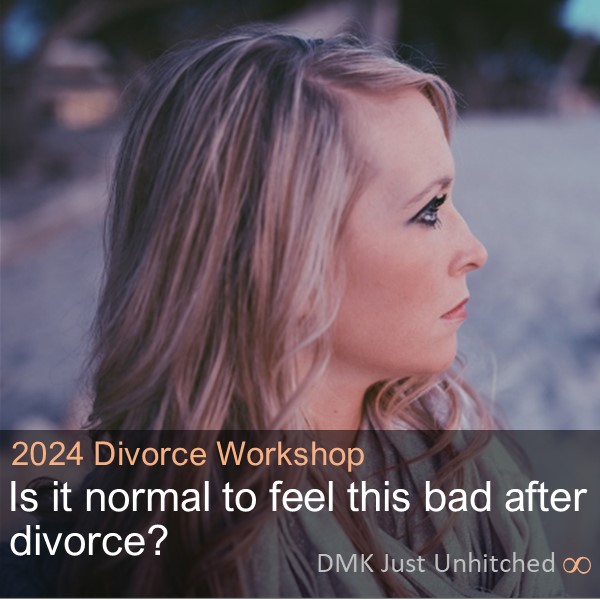Divorce can include many highs and lows that can lead to unresolved, conflicting feelings. The on-going negativity is emotionally draining and makes navigating your new single life difficult. It's important to remember that while you may feel some pretty abnormal feelings after divorcing you aren't abnormal.
However, the emotions and feelings don't represent your true self. They will continue to negatively affect your mood, self-esteem and life until you are able to let the marriage and the divorce go. But how?
Processing the stages of divorce
First, it helps to know the emotional stages of divorce. Each stage is a personal experience based on your personality, marriage, how the marriage ended, your former spouse, your divorce, family, finances and generally everything that's happening in your life. Whew!
The time it takes to completely progress from one stage to another is also highly dependent on these factors. It doesn't help to ignore or simply suppress some of the feelings associated with any of the stages of divorce. Doing so may elicit unusual behavior, actions and emotions that arise in response to identified or unidentified feelings. You should give yourself time and, possibly, seek counseling to adequately process your feelings about your former spouse, marriage and divorce.
Your emotional health is affected by divorce
Your overall emotional health will improve through identifying your feelings, their origins and precipitators. This will expedite your recovery from the divorce, what led to the divorce and the lingering after affects that continue to plague your life.
It isn't uncommon to have feelings that may cloak emotions that allow you the freedom to move forward.
If you're dealing with on-going, negative emotions without therapy and you get stuck in a specific stage of divorce, you may be in denial of certain problems or issues that are keeping you from progressing through your emotional loss.
Some emotions originate from others and are difficult to acknowledge
Sometimes we may feel one emotion as a result of failing to acknowledge another. Apathy or contempt may arise when we actually feel guilty or unable to control certain situations or life direction. Other commonly cloaked divorce emotions are anger and indignation spurred by fear, sadness, shame or frustration. Counseling can help you unravel all that has happened in your life and former marriage that makes it difficult to understand why you may have such mixed emotions and clouded emotional perspective.
It's normal to mourn the loss of a life you planned together
Regardless of the reasons your marriage failed or how much you disliked your spouse when it was over, the grief you have for your marriage is real. You likely did not marry your former spouse to get divorced years later. You had dreams, ambitions, a wonderful life planned together that are gone. Of course, you are grief stricken. Even if you don't grieve your former spouse, you grieve the marriage and the life you planned together.
The longer you were together, the harder it is going to be to let go. If the marriage ended abruptly, the shock of letting go of the love for your former spouse and marriage is going to be overwhelming until it's not.
If the marriage slowly degenerated into an ugly, painful experience you will have numerous emotions that can cause you to address the wrong problems first.
Divorce is personal, it's painful and confusing. So, don't feel bad if you get lost somewhere along the difficult journey to a better tomorrow. It's essential to recognize when this happens and do something about it. Don't just continue to walk aimlessly through your life with tons of emotional baggage that destroys future relationships and personal happiness.
It's time to turn around, face the future
When you're so focused on the past, you fail to realize you may feel lousy because you're not faced towards your future. Your heart and mind is focused entirely on your past problems, lost hopes and dreams when you need to be facing your potential, possibilities, new hopes and dreams.
To move forward you should realize what stage of divorce you are truly experiencing right now. Identify the origin of your feelings in order to work through them. Doing so may include facing some hard truths about yourself and decisions.
An active, healthy lifestyle helps lessen some of the negative aspects when "facing your demons". You need a lot of good in your life when dealing with so much bad. Simply put, the worse you feel, the more positive activities you should add. Soon, the positive stuff will begin to take your attention off the problems from the past and the life you want to live will slowly come into focus!
If you still struggle to identify your feelings and feel you are still unable to cope with your loss on your own, locate a good therapist or counselor to help with this part of your grief recovery. Your therapist should be a licensed health care professional who has experience in divorce recovery. Consider the DMK Directory to locate a counselor near you.
Regardless if you have a therapist or can get to the answers on your own, you'll need to ask yourself difficult questions that will aid in your recovery.
These are examples of helpful questions to aid in uncovering cloaked emotions.
- Are you missing your ex or the life you wanted together?
- Do you have anger towards him/her, or do you still have unresolved feelings for him?
- Do you still feel love for your former spouse or the loss of the financial and emotional security?
- Do you dislike your ex's new look, relationship(s) or attitude or feel stuck and frustrated that you can't move forward like him/her?
While these may not specifically apply to you, try to develop your own questions relevant to your specific situation. There is really no end to what we tell ourselves following heartbreak and divorce, in order to protect our heart, ego, dreams and feelings. So, if you can't seem to solve certain problems, know that it may be because you simply haven't faced the real issue yet.
Your feelings shouldn't be a puzzle
Once you identify your feelings, you should express them in constructive ways such as group therapy, continued counseling, exercise, meditation, socializing and other self-improvement and positive activities. The neat thing is that once you realize the origin of your feelings, you won't need to carry them around and include them in your everyday like a sub-conscious puzzle you feel but can't solve.
You'll express the bad feelings and replace them with new good experiences and memories to produce happiness and life satisfaction. You'll have broken through what makes you feel so bad, on your way to letting go of the past and accepting what's possible by building your new life and future. OurDMK.com



 How to resolve AdBlock issue?
How to resolve AdBlock issue?